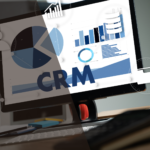Understanding the Risks of Data Protection using Free Online Tools and Software
In today’s digital age, free tools and software are widely available and tempting to use. From productivity applications to design programs, businesses and individuals alike take advantage of these resources to streamline tasks, often without considering the potential security risks involved such as data protection. While these tools provide convenience, they can also come with hidden dangers.
Most users are unaware that, when using free tools online, their personal information may be collected, sold, or exploited. The very nature of “free” software often means that the business model behind these tools is based on monetizing user data. Protecting your data while using these services is crucial for maintaining privacy and preventing cyberattacks.
Why Free Isn’t Always Free
While free online tools seem like a great deal, they often operate on a “freemium” or ad-supported model. This means users may not pay with money, but with their personal information. From email addresses to browsing habits, free software providers can collect vast amounts of data.
The Business Model Behind Free Tools
Many free software platforms sustain their business by collecting and selling user data to third-party advertisers. For example, they track user behavior, preferences, and patterns to create detailed profiles that are valuable to marketers. This business model allows these companies to continue providing free services, but at the cost of user privacy.
Data Collected by Free Software
The type of data collected varies but can include:
- Personally Identifiable Information (PII): This includes names, email addresses, phone numbers, and even physical addresses.
- Usage Data: Browsing history, interactions with software, and even time spent on various tasks can be tracked.
- Location Information: Many tools access your device’s location to offer tailored services, which can also be sold to third parties.
In worst-case scenarios, this data could be breached, sold to malicious entities, or used in ways that users never intended.
The Dangers of Data Exploitation
The consequences of giving away your personal data can range from mild annoyances, like targeted ads, to more severe issues like identity theft or cyberstalking. Users often don’t realize how exposed they are until it’s too late.
Targeted Advertising and User Manipulation
Many free software providers use collected data to target users with specific ads. While targeted ads seem harmless, they can influence user behavior in ways that aren’t always ethical. Some companies may manipulate their advertisements to play on users’ vulnerabilities or preferences, leading to overspending or even engagement in unsafe online practices.
Data Breaches and Identity Theft
More concerning are data breaches, where hackers gain access to a company’s stored data. In 2023 alone, millions of users had their personal information compromised due to data breaches from various online tools and platforms. Once personal data is leaked, it can lead to identity theft, fraudulent transactions, and long-term damage to an individual’s financial and social well-being.
Protecting Your Data When Using Free Tools
Given the risks, it’s important to take proactive steps to protect your personal information when using free software and tools. While it’s impossible to guarantee complete safety, certain practices can significantly minimize risks.
Read the Privacy Policy
Before using any free tool or software, always read the privacy policy. Look for red flags like data sharing with third parties or ambiguous language that leaves room for exploitation. Transparency is key when determining whether or not you can trust a platform with your data.
Use Strong, Unique Passwords
One of the easiest ways to protect yourself online is by using strong, unique passwords for each account. Never reuse passwords across different platforms, as this makes it easier for hackers to gain access to multiple accounts in the event of a data breach. Consider using a password manager to help create and store complex passwords.
Limit the Information You Share
Whenever possible, limit the amount of personal information you provide. Many tools allow you to use a minimal amount of data to function properly. Avoid connecting sensitive accounts (like your primary email or social media accounts) unless absolutely necessary.
Enable Two-Factor Authentication
Two-factor authentication (2FA) adds an additional layer of security to your accounts. This ensures that even if your password is compromised, attackers will still need a second piece of information to gain access. Always enable 2FA when using any tool or service that offers it.
The Legal Landscape for Data Protection
As the risks surrounding data collection and exploitation grow, governments around the world are beginning to take action to protect consumers. In recent years, several regions have passed data protection laws aimed at securing user privacy, with California leading the way in groundbreaking legislation.
California’s Consumer Brain Data Protection Law
Recently, California took a significant step in protecting its citizens’ privacy by passing a law aimed at securing consumers’ “brain data.” This law recognizes the growing potential for neurotechnology to collect information on human thoughts and emotions. Companies that use these tools are now required to disclose what type of brain data they are collecting and how it will be used.
The new law aims to safeguard personal autonomy and mental privacy, considering that the misuse of brain data could lead to unprecedented levels of manipulation. This regulation sets a precedent for how future laws may evolve as technology continues to advance, emphasizing the need for transparency and user consent.
Moving Towards a More Secure Digital Future
As technology advances, data collection methods will only become more sophisticated. Users must stay informed and vigilant, especially when using free tools and software online. While it’s easy to overlook privacy concerns in exchange for convenience, understanding the risks can help users make more informed choices.
The Role of Government Regulations
With laws like the General Data Protection Regulation (GDPR) in the European Union and California’s Consumer Privacy Act, the conversation around data protection has grown. Governments around the world are taking steps to ensure companies adhere to stricter privacy guidelines. However, these regulations are only one part of the equation—individuals must also take responsibility for their own data security.
User Empowerment Through Education
Ultimately, the key to protecting personal data lies in education. The more users understand the potential risks and the tools available to safeguard their information, the more secure the digital landscape will become. Always stay informed, and take proactive steps to ensure your online privacy remains intact.
Conclusion
While free online tools offer convenience, they often come with hidden costs in the form of data collection. Protecting your personal information is essential, especially as technology evolves and data privacy becomes an increasingly critical issue. By understanding the risks, using tools responsibly, and staying informed about emerging regulations, users can safeguard their privacy while still benefiting from the power of free software.



